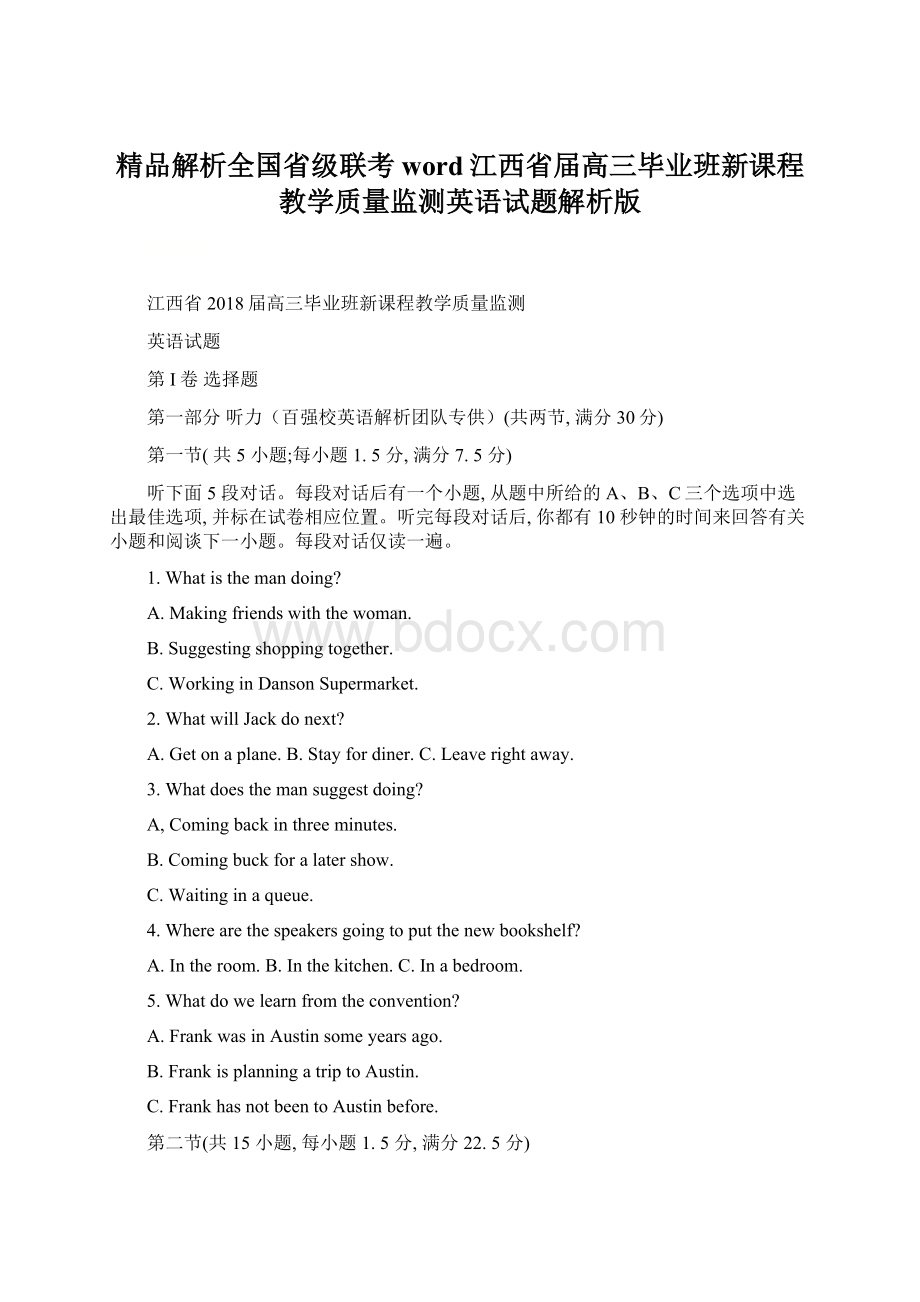精品解析全国省级联考word江西省届高三毕业班新课程教学质量监测英语试题解析版Word格式.docx
《精品解析全国省级联考word江西省届高三毕业班新课程教学质量监测英语试题解析版Word格式.docx》由会员分享,可在线阅读,更多相关《精品解析全国省级联考word江西省届高三毕业班新课程教学质量监测英语试题解析版Word格式.docx(19页珍藏版)》请在冰豆网上搜索。

plane.B.Stay
for
diner.C.Leave
right
away.
3.What
does
suggest
A,Coming
back
three
minutes.
B.Coming
buck
later
show.
C.Waiting
queue.
4.Where
are
speakers
going
to
put
new
bookshelf?
A.In
room.B.In
kitchen.C.In
bedroom.
5.What
we
learn
from
convention?
A.Frank
was
Austin
some
years
ago.
B.Frank
planning
trip
Austin.
C.Frank
has
not
been
before.
第二节(共15
小题,每小题1.5
分,满分22.5
段对话或独白。
徘段对话或独白后有几个小题,从题中所给的A、B、C
三个选项中选出最佳选项。
听每段对话或独白前,你将有时问阅读各个小题,每小题5
秒钟;
听完后,各小题将给出5
秒钟的作答时间。
每段对话或独白读两遍。
听第6
段材料,回答第6
至7
题。
6.Why
can’t
girl
go
cinema
tonight?
A.She
look
after
her
brother,
B.She’ll
help
brother
his
homework.
C.She’ll
boxing
exercises.
7.What
bay
A.Go
basketball
match.
B.Go
cinema.
C.Watch
television.
听第7段材料,回答第8至9题。
8.What
relationshipbetween
speakers?
A.Friends.B.Strangers.C.Husband
and
wife.
9.Why
Suzy
goanywhere?
A.There’s
no
ticket
left
anywhere.
B.She
lost
money
ticket.
C.She
missed
train.
听第8段材料,回答第10至12题。
10.What
conversation
about?
A.How
take
examinations
school.
B.How
arrange
classroom.
C.How
line.
11.Which
of
followings
needed
long-distance
examinations?
A.Examination
rooms
pencils.
B.Examination
supervisors(
监管者)and
rooms.
C.Pencils,erasers
examination
supervisors.
12.How
questions
answers
sent
examination?
A.By
handing
them
students.
B.By
announcing
them.
C.By
Internet.
听第9段材料,回答13
至16题。
13.What
Deric,Wan
Siu
Lun?
A.A
famous
singer.B.The
man’s
friend.C.Thewoman’shusband.
14.Which
according
conversation?
A.John
prefers
Hong
Kong
by
sea.
B.Deric’s
concert
May.
C.Deric’s
be
Beijing.
15.Why
prefer
plane?
A.It
more
interesting.B.It
cheaper.C.It
safest.
16.How
long
would
it
toHong
sea?
A.About
half
an
hour.B.About
one
day.C.About
days.
听第10
段材料,回答第17
至20
17.What
speech
mainly
large
variety
animals.
B.Crop
diversity.
C.The
increasing
population.
18.How
many
different
plants
exist
now?
A.One
hundred.B.One
thousand.C.Hundreds
thousands.
19.What
happened
world
over
past
century?
A.They
have
stayed
same.
B.They
continued
decrease.
C.They
increase.
20.What
responsible
fordamaging
plant
life?
A.Climate
change,loss
habitat,human
activities
so
on.
B.Climate
change,human
disappearance
genes.
C.Loss
habitat,poorly
planned
traditional
farming
methods.
第二部分阅读理解(百强校英语解析团队专供)(共两节,满分40分)
第一节(共15小题;
每小题2分,满分30分)
阅读下列短文,从每题所给的A、B、C和D四个选项中,选出最佳选项。
A
USpresidentDonaldTrumphaspopularizedthephrase“fakenews”ButnottoolongagothesewordsincombinationwouldhavemeantlittletoeverydayEnglishspeakers.
AnatolyLiberman,aGerman,writesabouttheoriginsoftheword“fake”.Theword,itturnsout,hasaverydarkpast.Thebestguessforhow“fake”becamemainstream,arguesLiberman,isthatitwasakindusedbythievesintheLondonunderworld.But“howitgotthere,nobodyintheworldknows,andprobablynobodywilleverknow,”hetellsQuartz.
LibermanisaprofessorattheUniversityofMinnesotaandtheauthorofWordOriginsandHowWeKnowThem.Hewritesthatearlyrecordsof“fake”asanEnglishadjectiveappearedaroundthemiddleofthe18thcentury.Thewordlikelycomesfromcant,orthiefjargon(行话).
TheOEDmentions“fake”asaverbstartingin1819,whichbasicallymeant‘todo”injargon,butalso“tokill,wound,orrob”.Anentryfromadictionarythatyearreads:
“Tofakeanypersonorplace,torobthem;
tofakeapersonmayalsoimplytoshoot,wound,orcut;
tofakeamanoutandout,istokillhim.”
LibermantracesthewordnexttoCharesDickens,whoused“cly-faker”,where“cly”meanspocket,inOliverTwist.Thisishowhebelievesknowledgeof“fake”asawordthatmeanstosteal,spread.EventuallyitbecameacommonplaceEnglishword.
1.Theunderlinedword“fake”inParagraph1probablymeans.
A.lying
B.true
C.common
D.interesting
2.WhatcanwelearnaboutAnatolyLiberman?
A.Heisskilledinsomeforeignlanguages.
B.HeisinterestedinalltheEnglishwords.
C.HelivedinEnglandforalongtime.
D.HelikeswritingarticlesinEnglishverymuch.
3.Whatismainlydiscussedinthispassage?
A.ThehistoryofEnglishwords.
B.SomestoriesaboutEnglishwords.
C.TheimportanceoftheEnglishword“fake”
D.TheoriginsofanEnglishword.
4.Whatcanweinferfromthispassage?
A.WemustfocusonthewordsofDonaldTrump.
B.WeshouldstudyEnglishwordsverycarefully.
C.“Fake”likelycomesfromwordsusedbyaclassofpeople.
D.AnatolyLibermanlikestotracethecommonplaceEnglishwords.
【答案】1.A2.A3.D4.C
【解析】美国总统特朗普使得“假新闻”这个词成为流行词。
文章探讨了“fake”这个词的起源。
它曾是伦敦底层社会里小偷之间的行话。
意为“做”,“杀死”,“偷”等意思。
1.词义猜测题。
美国总统特朗普17日在社交媒体推特上发布了他选出的2017年度“假新闻奖”。
从而使得“假新闻”一词成为流行词。
由此可知,fake的意思应为“假的”,结合选项,A选项正确。
2.推理判断题。
由第三段中的“LibermanisaprofessorattheUniversityofMinnesotaandtheauthorofWordOriginsandHowWeKnowThem”可知,利伯曼是明尼苏达大学的教授,也是《词源,我们如何探知它们》一书的作者。
且在文中他探索了fake一词的起源。
由此可以推知,他非常擅长外语。
A选项正确。
3.主旨大意题。
由文章第二段“AnatolyLiberman,aGerman,writesabouttheoriginsoftheword“fake””和下文的具体介绍可知,文章探讨了“fake”这个词的起源。
D选项正确。
4.推理判断题。
由第二段中的“Thebestguessforhow“fake”becamemainstream,arguesLiberman,isthatitwasakindusedbythievesintheLondonunderworld”可知,利伯曼提出,关于“fake”一词如何成为主流词,最可靠的猜测应该是,它曾是伦敦底层社会里小偷之间的行话。
故结合选项可知,C选项正确。
【名师点睛】依据逻辑推理猜测词义:
运用逻辑推理猜测词义是使用最广考查最多也最易失分的猜词方式。
要求考生具备整合分散、复杂信息的能力,充分利用上下文中相关的词汇并结合具体的语境,从形式和内容上把握语言之间的内在联系,理顺语言之间的逻辑关系,进而达到猜词的目的。
常见的逻辑关系有:
因果关系,同位关系,对比关系,转折关系等。
B
Competitionoccursnaturallybetweenlivingbeingswhichco-existinthesameenvironment.Inmodernsocietythereisagreatdealofargumentaboutcompetition.Somevalueithighly,believingthatitisresponsibleforsocialprogressandprosperity(繁荣).Otherssaythatcompetitionisbad;
thatitsetsonepersonagainstanother;
thatitleadstounfriendlyrelationshipbetweenpeople.
Ihavetaughtmanychildrenwhoheldthebeliefthattheirselfworthreliedonhowwelltheyperformedattennisandotherskills.Forthemplayingwellandwinningareoftenlifeanddeathaffairs.Intheirsinglemindedpursuit(追求)ofsuccess,thedevelopmentofmanyotherhumanqualitiesissadlyforgotten.
However,whilesomeseemtobelostinthedesiretosucceed,otherstakeanoppositeattitude.Inaculturewhichvaluesonlythewinnerandpaysnoattentiontotheordinaryplayers,theystronglyblamecompetition.Amongthemostvocalareyoungsterswhohavesufferedundercompetitivepressuresfromtheirparentsorsociety.
Teachingtheseyoungpeople,Ioftenobserveinthemadesiretofail.Theyseemtoseekfailurebynottryingtowinorachievesuccess.Bynottrying,theyalwayshaveanexcuse:
”Imayhavelost,butitdoesn’tmatterbecauseIreallydidn’ttry.”Whatisnotusuallyadmittedbythemselvesisthebeliefthatiftheyhadreallytriedandlost,thatwouldmeanalot.Suchalosswouldbeameasureoftheirworth.Clearly,thisbeliefisthesameasthatofthetruecompetitorswhotrytoprovethem-selves.Botharebasedonthemistakenbeliefthatone’sselfrespectreliesonhowwelloneperformsincomparisonwithothers.Bothareafraidofnotbeingvalued.Onlyasthisbasicandoftentroublesomefearbeginstodissolve(缓解)canwediscoveranewmeaningincompetition.
5.Whichisthemainpointofthispassage?
A.Competitionisaninterestingexperienceinone’slife.
B.Competitionishelpfultosetupself-respect.
C.Competitionisharmfultopersonalqualitydevelopment.
D.Differentopinionsaboutcompetitionamongpeople.
6.Whydosomepeoplevaluecompetitionhighly?
A.Theythinkitmakesnationsbecomerich.
B.Theythinkithelpstoimprovepeople’sabilities.
C.Theythinkithasthedutytopushsocietyforward.
D.Theythinkitmakesnationsmorecompetitive.
7.Whatisthemeaningoftheunderlinedphrase“themostvocal”inParagraph3?
A.Thosewhostronglyblamecompetition.
B.Thosewhovaluecompetitionhighly.
C.Thosewhowantsuccessverymuch.
D.Thosewhofailmanytimes.
8.Whatcanweknowaboutcompetition?
A.Itcandetermineone’sachievement.
B.Itswinningshouldbecomealife-and-deathmatter.
C.Itshouldbeencouragedinallcountriesintheworld.
D.Itariseswhenagoalcannotbeshared.
【答案】5.D6.C7.A8.D
【解析】这是一篇议论文。
文章阐述了人们对竞争的不同看法。
5.主旨大意题。
第一段中提到“Inmodernsocietythereisagreatdealofargumentaboutcompetition”。
由第二段起,作者以自己的学生为例,具体阐述了人们对竞争的不同看法。
故文章中心为D选项。
6.细节理解题。
由第一段中的“Somevalueithighly,believingthatitisresponsibleforsocialprogressandprosperity(繁荣)”可知,一些人非常重视竞争,他们认为竞争负担着社会进步和繁荣的责任。
故C选项正确。
8.推理判断题。
由最后一段中的“Bothareafraidofnotbeingvalued.Onlyasthisbasicandoftentroublesomefearbeginstodissolve(缓解)canwediscoveranewmeaningincompetition”可知,竞争的根源在于人们害怕不受重视。
只有当人们为了共同目标努力,而不是担心个人是否受重视时,那么,人们才可以在竞争中发现新的意义。
由此可以推知,当人们没有共同目标,只为个人努力时,竞争就出现了。
故D选项正确。
【名师点睛】细节理解题解题策略:
变通理解,间接转述找答案。
细节理解题通常采用词语和句